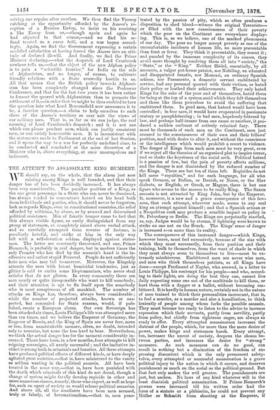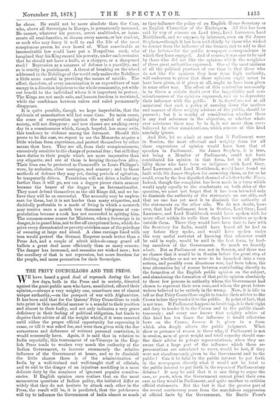THE ATTEMPT TO ASSASSINATE KING HUMBERT.
WE should say, on the whole, that the alarm just now existing among Kings is well founded, and that their danger has of late been decidedly increased. It has always been very considerable. The peculiar position of a King, as the one great personage in a State who can never be dismissed, has always tended to concentrate hatred on his head both from individuals and parties, who, it should never be forgotten, lack as regards Kings, even in constitutional countries, the relief afforded by criticism, by abuse, or by avowed and determined political resistance. Men of fanatic temper come to feel that this always visible figure, so easily distinguished from any group of statesmen, so completely raised above verbal attack, and so carefully exempted from reverse of fortune, is peculiarly hateful, and strike at him in the only way left with a self-devotion seldom displayed against states- men. The latter are constantly threatened, and one, Prince Bismarck, is probably in real danger, but in modern times the only Premier who has died by the assassin's hand is the in- offensive and rather stupid Perceval. People do not sufficiently hate men who may fall to-morrow. Moreover, the Kingship attracts the men with latent homicidal tendencies, just as glitter is said to excite some kleptomaniacs, who never steal articles that do not glisten. In every community there are men nearly or quite irresponsible who want to kill somebody, and their attention is apt to fix itself upon the somebody who is most conspicuous of all mankind. The number of attacks on Kings has, therefore, always been considerable ; while the number of projected attacks, known or sus- pected, but concealed for State reasons, would, if pub- lished, create a European alarm. Our own Sovereign has been attacked six times, Louis Philippe's life was attempted more than ten times, and we believe the Emperor of Germany, the Emperor of Russia, and the King of Spain are never free, more or less, from unmistakable menace, often, no doubt, intended only to terrorise, but none the less hard to bear. Nevertheless, we think the actual danger has for the moment considerably in- creased. There have been, in a few months, four attempts to kill reigning sovereigns, all nearly successful ; and the imitative in- stinct is strong both in criminals and lunatics. All these attempts have produced political effects of different kinds, or have deeply agitated great societies,—that is, have ministered to the vanity so seldom wanting in the political assassin. All have been treated in the same way,—that is, have been punished with the death which criminals of this kind do not dread, though a change of system might fatally develop regicide in other and more numerous classes, namely, those who expect, as well as hope for, such an upset of society as would release political assassins. And above all, all the assailants have been men accused, truly or falsely, of Internationalism,—that is, men pene- trated by the passion of pity, which so often produces a disposition to shed blood—witness the original Terrorists— or filled with the new consciousness of their poverty which the poor on the Continent are everywhere display- ing. This is, as we believe, one of the marked phenomena of our day. The poor no longer accept poverty as one of the uncomfortable incidents of human life, no more preventable than frost or fever. They think it preventable, they resent it ; and puzzled by the immense complexity of its causes, they avoid more thought by resolving them all into " society," the "State," or the " King." Neither Hodel, essentially, by all accounts, a vulgar pot-house patriot, nor Nobiling, an educated and disappointed fanatic, nor Muncasi, an ordinary Spanish artisan, nor Passanente, a domestic servant embittered by service, had any personal quarrel with their victims, or hated their policy or loathed their achievements. They only hated Kings for the sake of the poor and of themselves, hated them for being at the top of a system amid which they felt themselves and those like them powerless to avoid the suffering that embittered them. In good men, that hatred would have been controlled ; in free men, it would have evaporated in passionate oratory or pamphleteering ; in bad men, hopelessly fettered by law, and perhaps half-insane from one cause or another, it pro- duced a sudden outburst of actively criminal fury. There must be thousands of such men on the Continent, men just aroused to the consciousness of their own and their fellows' position, mad with desire to alter it, and without the conscience or the intelligence which would prohibit a resort to violence. The danger of Kings from such men must be very great, even if we reject all the theories of an organised plot to inspire terror, and so shake the keystones of the social arch. Political hatred is a passion of few, but the pain of poverty affects millions, and the danger is not diminished by the reduced number of the Kings. There are but ten of them left. Regicides do not kill mere "royalties," and for each language, for all who speak German, or Italian, or Danish, or Norse, or the Slav dialects, or English, or Greek, or Magyar, there is but one figure who seems to the masses to be really King. The Saxon assassin is not attracted by King John, but by the Emperor. It, moreover, is a new and a grave consequence of this few- ness, that each attempt, wherever made, seems to any real king an attempt against himself ; and that a Spanish artisan or a Neapolitan cook may produce a sensible impact on policy in St. Petersburg or Berlin. The Kings are perpetually startled, as, say, Judges would be by storms, if lightning were known to strike no one not on the Bench. The Kings' sense of danger is increased even more than its reality.
The consequences of this increased danger—which Kings, however brave, must feel excessively, because of the size with which they must necessarily, from their position and their training, bulk to themselves, from the want of shade in which they must always seem to themselves to live—must be ex- tremely mischievous. Embittered men are never wise men, and men who think themselves patriots, as all Kings have done—except Ferdinand of Naples, who avowed, in a letter to Louis Philippe, his contempt for his people—and who, accord- ing to their lights, are doing the best they can, cannot live daily expecting some one out of the multitude to kill them, or hurt them with a dagger or a bullet, without becoming em- bittered. It is hardly in human nature, certainly not in the nature of men trained to think their personalities sacroscant, that is, to feel a murder, as a murder and also a humiliation, to think leniently of people among whom lurks the possible assassin. They must become too ready to listen to the advice to increase repression which their servants, partly from servility, partly from policy, but chiefly from righteous anger, are always so ready to offer. Every attempted assassination increases the distrust of the people, which, far more than the mere desire of power, makes kings and statesmen harsh. Every attempt, too, increases the unrest of society, deepens the chasm be- tween parties, and increases the desire for "strong" measures. As such measures can do no good, can result in nothing but a diminution of the freedom of ex- pressing discontent which is the only permanent safety- valve, every attempted or successful assassination is a grave political injury to the nation in which it occurs, and deserves punishment as much on the social as the political ground. But that fact only makes the evil greater. The punishments are just, but useless. No laws of any kind whatever will in the least diminish political assassination. If Prince Bismarck's powers were increased till his written order had the force of a statute or a plebiscite, he could not prevent any Miller or Elohmidt from shooting at the Emperor, it
he chose. He could not be more absolute than the Czar, who, above all Sovereigns in Europe, is permanently menaced. He cannot, whatever his powers, arrest multitudes, or incar- cerate all semi-lunatics, or disarm every mason, or law student, or cook who may fancy it well to end the life of the most conspicuous person he ever heard of. What conceivable or inconceivable law could have put a Neapolitan cook, who imagined that his King caused his poverty, under such restraint that he should not have a knife, or a chopper, or a sharpened steel ? Repression as a measure of defence is a puerility, and so is cruelty in punishment. A threat of breaking on the wheel addressed to the Nobilings of the world only makes the Nobilings a little more careful in providing the means of suicide. The effect, therefore, of every assassination is an expenditure of vast energy in a direction injurious to the whole community, yet with- out benefit to the individual whom it is important to protect. The Kings are not made safe, and human freedom is restricted, while the confidence between rulers and ruled permanently disappears.
It is quite possible, though we hope improbable, that the epidemic of assassination will last some time. Its main cause, the sense of exasperation against the symbol of existing society, will not disappear ; and new classes are awaking every day to a consciousness which, though hopeful, has many evils, this tendency to violence among the foremost. Should this prove to be the case, we expect to see the Monarchs acquire a little wisdom from experience, and protect themselves by other means than laws. They are all, from their conspicuousness, excessively sensitive to the charge of personal fear ; but still they have duties to their people which are more imperative than any etiquette, and one of them is keeping themselves alive. Their lives can be protected as Cromwell's or Louis Philippe's were, by seclusion, close carriages, and armour ; and to those methods of defence they may yet, during periods of agitation, be temporarily driven. Fanaticism will not drive a bullet any farther than it will go, nor can a dagger pierce chain armour because the bearer of the dagger is an Internationalist. They must defend themselves as the old Kings did, and we be- lieve they will be as successful. The necessity may be unplea- sant for them, but it is not harder than many etiquettes, and decidedly preferable to a mode of living in which a monarch may receive once a month two thousand telegrams of con- gratulation because a cook has not succeeded in spitting him. The common-sense course for Ministers, when a Sovereign is in danger, is to guard him, not to fire off exceptional laws, which de- prive every discontented or poverty-stricken man of the privilege of swearing at large and aloud. A close carriage lined with iron would protect the German Emperor much better than a Press Act, and a couple of adroit aides-de-camp guard off bullets a great deal more efficiently than as many censors. The danger has increased, and assassins are wicked men ; but the corollary of that is not repression, but more freedom for the people, and more precaution for their Sovereigns.



































 Previous page
Previous page